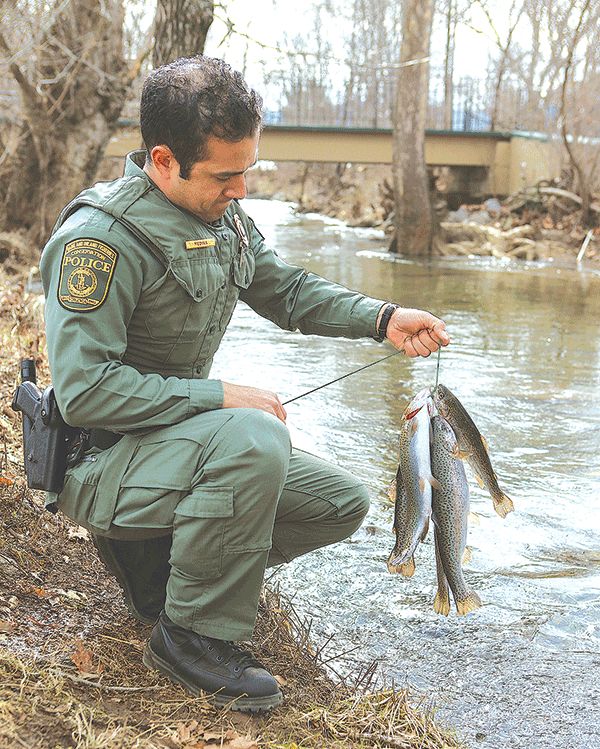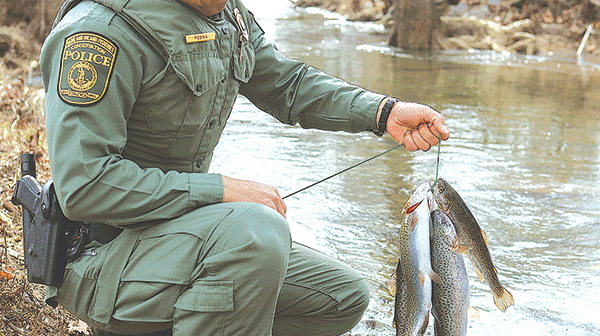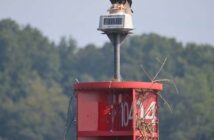
Jon Hart follows the same routine he has followed for the past 18 years. He dresses in his crisp, clean uniform, puts a bulletproof vest on and heads out the door to work.
Hart is a conservation police officer with the Virginia Department of Game and Inland Fisheries. He has served in Chesterfield for the past two years after moving from the Mecklenburg area.
Officials say that conservation police officers patrol the vast and diverse geographical expanses of the commonwealth. They are ever-vigilant in enforcing the laws related to hunting, fishing, and boating, educating the public and offering assistance in a wide variety of enforcement activities.
“I served as a military police officer in the Air Force,” Hart said. “I got a degree in criminal justice while in the Air Force. I knew I wanted to do something in law enforcement when I got out. I’m from Virginia, and I came back to Virginia.”
Conservation police officers are certified through the state’s Department of Criminal Justice Services and have authority to enforce all of the laws of Virginia. As deputy U.S. Fish and Wildlife special agents, they may also conduct investigations and cross state lines when violations of federal wildlife laws have been committed.
The officers have a lot of responsibilities.
“The main job is law enforcement,” Hart said. “We know that most people who buy a license to hunt or fish are law-abiding citizens. But there is a small percentage who have no regard for the law and don’t care if they are breaking the law.”
Hart says he has caught some poachers.
Conservation officers are often called upon by other state and local enforcement agencies to assist with various enforcement actions, due in part to their ability to deal with a complex array of issues. They may work at a youth fishing day, track a violent offender over rough terrain or provide law enforcement services in the wake of a natural disaster.
“We handle some wildlife nuisance calls,” Hart said. “But animal control usually responds to that, and Chesterfield Animal Control goes above and beyond to assist on wildlife calls. Some animal control departments in other jurisdictions won’t handle wildlife nuisance calls.”
Game and Inland Fisheries has seen a few changes over the years, including their name.
In 1903, game wardens (a title changed to
They learned on the job with little formal training except that provided by local sheriffs and police departments. In 1916, the Virginia General Assembly established the Game Commission and charged it with managing the fisheries and wildlife resources of the commonwealth.
Changes have come in the hiring, recruitment, and training processes since those early days. Today, applicants interested in a career in natural resources law enforcement are likely to compete with nearly a thousand others for the privilege of obtaining one of the few positions to attend the state-of-the-art training academy and study its comprehensive law enforcement training curriculum.
Hard said he enjoys being outdoors and law enforcement. “You don’t sit in an office all day,” he said.
Officials say that before pursuing this career path, candidates should consider both the attraction of working outdoors and the inherent dangers of the profession.
Conservation police officers enforce laws and regulations that regulate the activities of sportsmen and women who participate in outdoor recreation.
They primarily enforce the fish, wildlife and boating laws while patrolling their areas of assignment using four-wheel-drive police vehicles, boats of various sizes, mountain bikes and ATVs.
There are 184 conservation police officers in Virginia.


